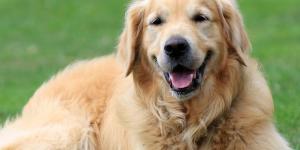Golden Retriever

The Golden Retriever originates from the United Kingdom, more specifically from Scotland. They were born around 1850 in a search for a hunter dog that was able not to hurt the prey. That is why we observe hunting and tracking skills in the beautiful golden retriever.
They are one of the most popular breeds in the world because of their versatility and intelligence. Nowadays, as well as being an excellent pet, they can be great support dogs. For people with physical disabilities, for hunting, as a police dog or firefighter and even as a rescue dog.
- Europe
- United Kingdom
- Group VII
- 5-14
- 14-18
- 18-22
- 22-27
- 27-31
- More than 31
- 2-7
- 7-22
- 22-55
- 55-100
- 100-220
- 8-10
- 10-12
- 12-14
- 15-20
- Low
- Meidum
- High
Physical Appearance
They are strong and large dogs. There are two types of golden retriever with some slight differences: the British and American-Canadian. The British has the broadest snout, the deepest chest and the somewhat shorter tail. They are heavier than their American cousin, showing an angulation in the dog's hind quarters and slanted eyes. Their head is large as well as the body, which looks robust and athletic.
They have a medium-long coat that is generally smooth, golden in color and repellent to water. In Canada we will find darker specimens but all follow a line of clear shades like gold or cream, never red or mahogany.
Character
The Golden Retriever is a friendly, affable and energetic dog. They have a good temperament and mentally they are agile dogs. They are very loyal to their owners. Showing them their intelligence, adaptability, docility and great willingness to please. All these qualities describe the breed and make it unique and special.
They are not dogs of a single person, they are usually friendly with strangers and for that reason they are not used like guard dogs. In general they are not aggressive, shy or hostile.
Health
Like any breed of dog, you should regularly go to your veterinary clinic to have the relevant vaccinations and checkups done. They suffer from some genetic disorders and other diseases such as:
- Hip or elbow dysplasia
- Obesity and overweight
- Cancer
- Cataracts, progressive retinal atrophy
Most of these diseases are developed in elderly individuals, but we must still be aware of our Golden Retriever's health and be careful with food. They are tremendously sweet and will do everything in their power to get you to reward them.
Caring for a golden retriever
The golden retriever can adapt to living in a flat or a house without a problem. What is essential is that they receive their necessary exercise over the course of three daily walks. They are very active dogs.
The golden retriever's hair will need brushing a couple of times a week and we should offer greater care in times of hair changes (spring and autumn). The bathroom should be every 2 or 3 months, so we advise you to look for long-lasting pipettes.
Their food must be balanced and according to the amount of exercise the dog does, so always have fresh and abundant water for them to drink.
Behavior
Like all dogs, the Golden Retriever must be socialized with people and pets from an early age. They do not require a complex education such as other races that require a more expert leader. The Golden will be willing to obey without problems. They adapt perfectly to the coexistence with children and other animals.
Except in very specific cases the golden retriever is usually a well behaved and docile dog.
Training a golden retriever
They are classified in number 4 of the most intelligent races according to Stanley Coren. If you adopt a golden retriever as a pet and you dedicate time and consistency, you will have an incredibly obedient dog. A dog willing to perform many tricks and commands, successfully.
The golden retriever is a dog that will make us want to interact. This breed will enjoy various daily activities especially if they receive some kind of reward. Swimming, picking up the newspaper or games with different dolls will exercise both your physique and your mind.
They are great dogs for activities such as agility, helping people with physical disabilities, doing therapeutic or rescue functions and even drug tracking.
Golden Retriever photos




















